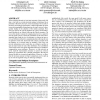Free Online Productivity Tools
i2Speak
i2Symbol
i2OCR
iTex2Img
iWeb2Print
iWeb2Shot
i2Type
iPdf2Split
iPdf2Merge
i2Bopomofo
i2Arabic
i2Style
i2Image
i2PDF
iLatex2Rtf
Sci2ools
132
Voted
EDBT
2010
ACM
2010
ACM
Efficient computation of trade-off skylines
When selecting alternatives from large amounts of data, trade-offs play a vital role in everyday decision making. In databases this is primarily reflected by the top-k retrieval paradigm. But recently it has been convincingly argued that it is almost impossible for users to provide meaningful scoring functions for top-k retrieval, subsequently leading to the adoption of the skyline paradigm. Here users just specify the relevant attributes in a query and all suboptimal alternatives are filtered following the Pareto semantics. Up to now the intuitive concept of compensation, however, cannot be used in skyline queries, which also contributes to the often unmanageably large result set sizes. In this paper we discuss an innovative and efficient method for computing skylines allowing the use of qualitative trade-offs. Such trade-offs compare examples from the database on a focused subset of attributes. Thus, users can provide information on how much they are willing to sacrifice to gain an ...
Related Content
| Added | 18 May 2010 |
| Updated | 18 May 2010 |
| Type | Conference |
| Year | 2010 |
| Where | EDBT |
| Authors | Christoph Lofi, Ulrich Güntzer, Wolf-Tilo Balke |
Comments (0)

